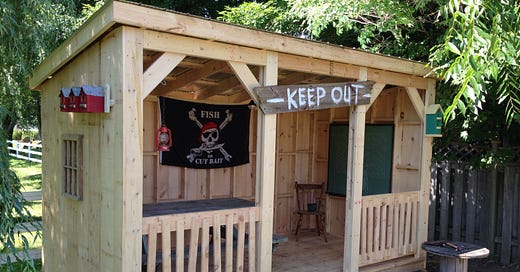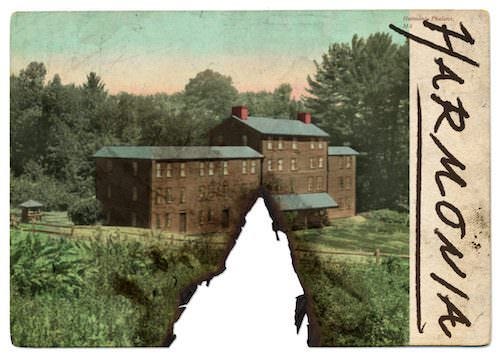Hello!
Robin recommends dividing newsletters into “seasons”, to give a sense of progress, and an opportunity to make big changes. It’s hard to imagine what progress looks like any more — it feels like everything has been in stasis since the first lockdown began ten months ago. All I’m left with is watching the trees outside my living room window, as they’ve gone from spring growth, through summer and autumn, and now bare winter branches.
There are no big changes here, but time passes on and the seasons are very real. So for what it’s worth, welcome to a new season. Let’s hope it’s a good one.
clubhouse culture
Matt Webb writes about what he calls "virtual private neighbourhoods". These are spaces online, with small numbers of users (<100), where people are "homesteading": hanging out, making jokes, being sociable without the constant gaze of the social media panopticon. His prototyical example is a Discord server, a set of linked chatrooms built around a common interest.
I've been thinking a lot about these spaces, which I like to call "clubhouses". They've been with us as long as I've been on the internet — I remember spending far too much time on Yahoo Groups in the 90s, my friend Fred's website/forum in the early 00s, IRC channels, Slack, Discord and Mastodon servers. In a sense, the global timelines and instant virality of modern social media are a historical aberration, and the long arc of internet history has always held a space for small group socialising.
What's interesting to me is how little exploration there is in the design of these spaces. We see two main lineages. In the first, we see chatrooms, IRC, Slack, Discord: realtime group messaging across one or more distinct "channels". The other is the message board or forum: asynchronous threaded messages divided into "topics". More recently, we start to see a sort of Twitter-inspired hybrid (Mastodon is the prime example), and a repurposing of online games spaces (I'm very curious how much of the time spent in e.g. Roblox is spent actually playing the game).
Of course, the reason for the lack of innovation is simple. A small group is unlikely to have the resources to build their own software. If they have any development skills, they're far more likely to be directed towards minor tweaks to an existing system. On the other hand, the companies making money out of this (Slack, Discord, etc) can't innovate much because they're trying to provide a uniform service to a wide range of different groups.
There's still a desire for customisation — a clubhouse isn't a clubhouse unless you can put your own posters on the walls, redecorate a bit. There are a million different bots available which fill some of this void, and Discord make most of their money by charging people to be able to use custom emoji etc. But these are all cosmetic changes on top of a fairly inflexible underlying structure.
What I haven't seen is a system which is built to be customised — less of an all-in-one solution than a set of building blocks. I'm not even sure what those blocks would look like, but is it possible to have a single system which could be reconfigured to look like Discord, or like Twitter, or like Zone?
Of course, one could argue that nobody actually wants this. Everybody's happy with Discord, or phpBB, or whatever. But I think that's unlikely. What are the odds that we stumbled on the best way to do this a couple of decades ago, and nothing's changed since? How likely is it that all of these disparate groups have the same wants and needs? And how much more fun would it be if every group had their own weirdo social space?
recommendations
Over Christmas, I devoured Susanna Clarke’s second novel, Piranesi. Clarke’s first book was Jonathan Strange and Mr Norrell (also great, as is the BBC adaptation) - this is similar but different, airy instead of earthy. A strange mish-mash of The Bridge, Anathem, and Tlön, Uqbar, Orbis Tertius.
On a more earthly note, I finally got around to playing Liza Daly’s Harmonia. It’s a lightly interactive story about nineteenth century utopianism, feminism, and academia. It’s beautifully written, and a great example of a work of interactive fiction where the interactivity genuinely functions as a literary device.
The Traveling Swordsman Problem: my friend Everest has been attempting to play The Legend of Zelda: Breath of the Wild without ever crossing their own path. They’ve been streaming it, and it’s fascinating in the way that the best speed-runs are, deconstructing the game and turning it into something else almost, but not quite entirely. Previous episodes are on YouTube, and the live broadcasts are weekly on Twitch. (full disclosure, the terrible name is my fault).



